Filter by

Poverty, inequality, and policy in Latin America
Papers from a conference held at the Ibero-America Institute for Economic Research in G?ottingen, Germany, in July 2005 and co-sponsored by the CESifo research network.Here, experts examine the dynamics of poverty and inequality in Latin America and policies to address them using new tools and data.OCLC-licensed vendor bibliographic record.
- Edition
- -
- ISBN/ISSN
- 9780262255400
- Collation
- 1 online resource (vi, 324 pages) :illustrations.
- Series Title
- -
- Call Number
- -

Latin America's political economy of the possible :beyond good revolutionarie…
AnnotationOCLC-licensed vendor bibliographic record.
- Edition
- -
- ISBN/ISSN
- 9780262283021
- Collation
- 1 online resource (xix, 250 pages) :illustrations
- Series Title
- -
- Call Number
- -
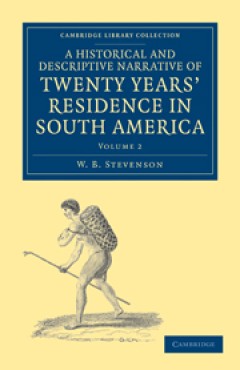
A Historical and Descriptive Narrative of Twenty Years' Residence in South Am…
In 1804 when W. B. Stevenson (fl. 1803–25) arrived on the small island of Mocha, just off the coast of South America, he stepped onto a continent on the brink of mass revolution. Over the next twenty years, he had an extraordinary range of experiences: as a traveller, a Spanish government official, a prisoner, and as secretary to an ex-Royal Navy admiral turned revolutionary. In this three-vo…
- Edition
- -
- ISBN/ISSN
- 9781139060592
- Collation
- -
- Series Title
- Cambridge Library Collection - Latin American Studies
- Call Number
- -
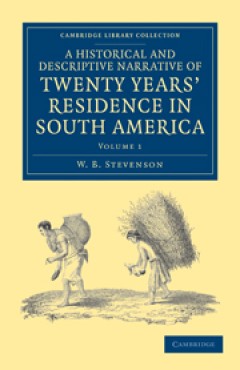
A Historical and Descriptive Narrative of Twenty Years' Residence in South Am…
In 1804 when W. B. Stevenson (fl. 1803–25) arrived on the small island of Mocha, just off the coast of South America, he stepped onto a continent on the brink of mass revolution. Over the next twenty years, he had an extraordinary range of experiences: as a traveller, a Spanish government official, a prisoner, and as secretary to an ex-Royal Navy admiral turned revolutionary. In this three-vo…
- Edition
- -
- ISBN/ISSN
- 9781139060585
- Collation
- -
- Series Title
- -
- Call Number
- -
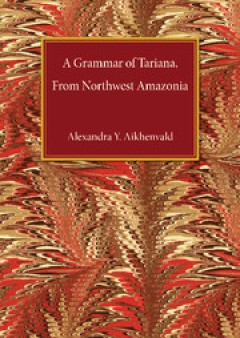
A Grammar of Tariana, from Northwest Amazonia
This is a comprehensive reference grammar of Tariana, an endangered Arawak language from a remote region in the northwest Amazonian jungle. Its speakers traditionally marry someone speaking a different language, and as a result most people are fluent in five or six languages. Because of this rampant multilingualism, Tariana combines a number of features inherited from the protolanguage with pro…
- Edition
- -
- ISBN/ISSN
- 9781107050952
- Collation
- -
- Series Title
- -
- Call Number
- -
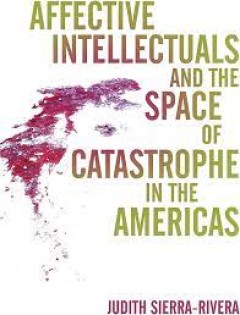
Affective Intellectuals and the Space of Catastrophe in the Americas
Most importantly, the book shows how literature constitutes an alternative public sphere for Black people. In a society largely controlled by white supremacist actors and institutions, Black authors have conjured fiction into a space where hard questions can be asked and answered and where the work of combatting collective, racist suppression can occur without replicating oppressive hierarchies…
- Edition
- -
- ISBN/ISSN
- 9780814254950
- Collation
- -
- Series Title
- -
- Call Number
- -
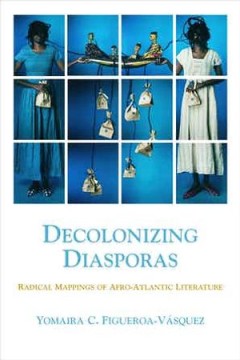
Decolonizing Diasporas : Radical Mappings of Afro-Atlantic Literature
Decolonizing Diasporas proposes a new way to read the literary and cultural productions of the Afro-Atlantic. Mapping literature from Spanish-speaking Sub-Saharan African and Afro-Latinx Caribbean diasporas, Figueroa-Vásquez argues that the works of diasporic writers and artists offer ways of imagining new worldviews which dismantle the logics of colonial modernity. Utilizing women of color fe…
- Edition
- -
- ISBN/ISSN
- 9780810142435
- Collation
- 304 halaman
- Series Title
- -
- Call Number
- 800 FIG d
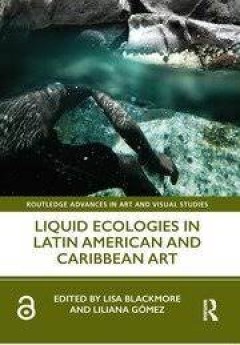
Liquid Ecologies in Latin American and Caribbean Art
This interdisciplinary book brings into dialogue research on how different fluids and bodies of water are mobilised as liquid ecologies in the arts in Latin America and the Caribbean. Examining the visual arts, including multimedia installations, performance, photography and film, the chapters place diverse fluids and systems of flow in art historical, ecocritical and cultural analytical contex…
- Edition
- -
- ISBN/ISSN
- 9780367198985
- Collation
- -
- Series Title
- -
- Call Number
- -

A Description of Patagonia, and the Adjoining Parts of South America
Thomas Falkner (1707–84), one-time pupil of both Richard Mead and Isaac Newton, was an English Jesuit missionary who lived for nearly forty years in South America until 1767, when he returned to England following the Jesuits' expulsion from Córdoba. Originally published in 1774 in the hope that it 'might be of some public utility, and might also afford some amusement to the curious', this is…
- Edition
- -
- ISBN/ISSN
- 9781139775472
- Collation
- -
- Series Title
- Cambridge Library Collection - Latin American Studies
- Call Number
- -
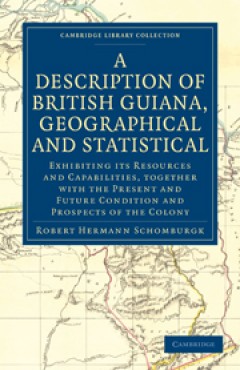
A Description of British Guiana, Geographical and Statistical
Sir Robert Hermann Schomburgk (1804–1865) was a German-born surveyor and traveller. In 1835–1839 he explored British Guiana for the Royal Geographical Society. In 1840 he was appointed to define its boundaries with Brazil, as Brazilian encroachments were wiping out native tribes. His report to the Colonial Office was published as A Description of British Guiana, Geographical and Statistical…
- Edition
- -
- ISBN/ISSN
- 9780511783586
- Collation
- -
- Series Title
- Cambridge Library Collection - Latin American Studies
- Call Number
- -
 Computer Science, Information & General Works
Computer Science, Information & General Works  Philosophy & Psychology
Philosophy & Psychology  Religion
Religion  Social Sciences
Social Sciences  Language
Language  Pure Science
Pure Science  Applied Sciences
Applied Sciences  Art & Recreation
Art & Recreation  Literature
Literature  History & Geography
History & Geography